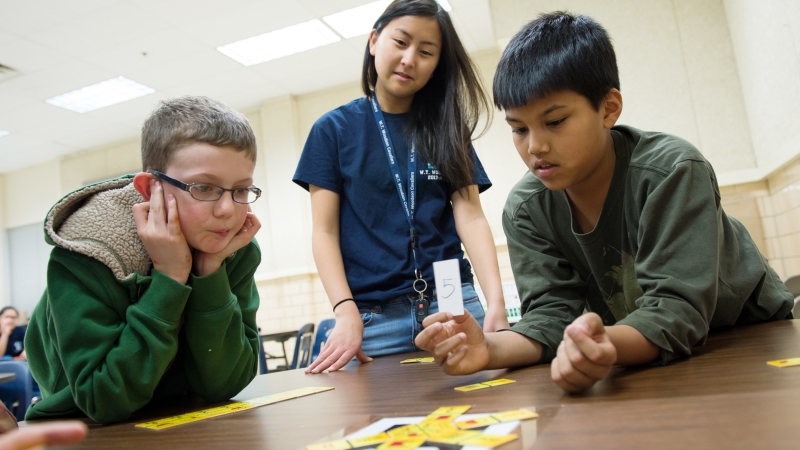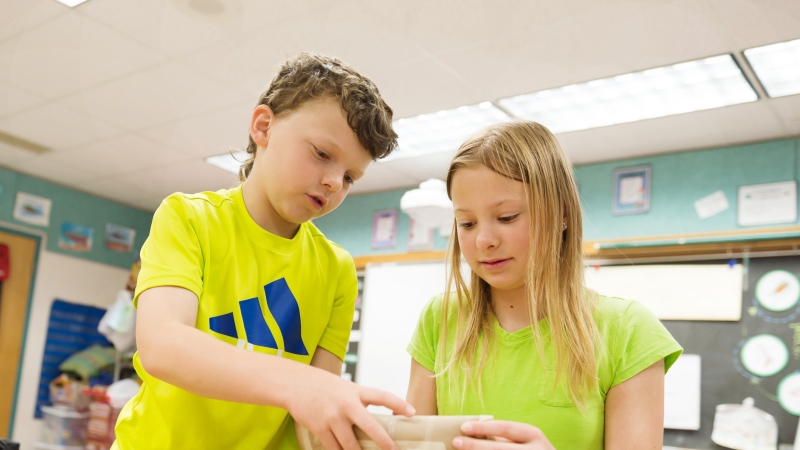Grade 5 Science Curriculum
Family-facing version of the grade 5 science curriculum
Goals
The purposes of scientific investigation and discovery are to satisfy humankind’s quest for knowledge and understanding and to preserve and enhance the quality of the human experience. Therefore, as a result of science instruction, students will be able to achieve the following objectives:
- Develop and use an experimental design in scientific inquiry.
- Use the language of science to communicate understanding.
- Investigate phenomena using technology.
- Apply scientific concepts, skills, and processes to everyday experiences.
- Experience the richness and excitement of scientific discovery of the natural world through the collaborative quest for knowledge and understanding.
- Make informed decisions regarding contemporary issues.
- Develop scientific dispositions and habits of mind.
- Develop an understanding of the interrelationship of science with technology, engineering, and mathematics.
- Explore science-related careers and interests.
Quarterly Overview of Grade 5 Science
The objectives and outcomes for each unit are common across FCPS and based on the Virginia Standards of Learning. The pacing by quarter and by week provides an example of how the curriculum can be organized throughout the year. Teacher teams may adjust the pacing or order of units to best meet the needs of students.
Units and Details
Students will investigate and understand that:
- energy can take many forms.
- there is a relationship between force and energy of moving objects.
- the conservation of energy resources is important.
Students will understand:
- There are a variety of forces always acting upon objects, affecting the way the objects move.
- Because the natural world is understandable, scientists use logic and innovation to apply what they learn from nature and develop technology useful for humans.
- Energy can occur in different forms. It can be transferred between objects or it can be transformed from one form to another, but it cannot be created or destroyed.
- Sources of energy can be conserved (used wisely and protected).
Extended Standards
In addition to the Virginia Standards of Learning above, students who receive Full-Time Advanced Academic Services engage with these extensions.
- Design, perform, and report on the results of experiments related to a given problem.
- Provide evidence and data to support a claim, issue, or thesis statement.
- Make inferences, based on evidence.
- Formulate multiple perspectives about a given issue.
- Evaluate the credibility and accuracy of data sources and note any discrepancies among the data.
- Identify a concept or “Big Idea” that supports interdisciplinary connections e.g. change, systems, patterns, relationships, etc. to analyze real world problems.
- Develop analytical and interpretive skills in nonfiction texts and/or other reliable media sources.
- Investigate and describe what happens to an object when it transfers energy.
- Investigate and describe multiple forms of energy.
Students will investigate and understand that:
- matter has properties and interactions.
- Earth constantly changes.
Students will understand:
- Changes on and within Earth happen both gradually and suddenly, impacting ecosystems by causing the creation, destruction, or movement of land.
- Scientists use observations to classify, make inferences, draw conclusions, and predict changes in the future.
- The surface of Earth can be changed through human impact, and humans can respond, make decisions, and act in order to control negative changes.
Extended Standards
In addition to the Virginia Standards of Learning above, students who receive Full-Time Advanced Academic Services engage with these extensions.
- Design, perform, and report on the results of experiments related to a given problem.
- Provide evidence and data to support a claim, issue, or thesis statement.
- Make inferences, based on evidence.
- Formulate multiple perspectives about a given issue.
- Evaluate the credibility and accuracy of data sources and note any discrepancies among the data.
- Identify a concept or “Big Idea” that supports interdisciplinary connections e.g. change, systems, patterns, relationships, etc. to analyze real world problems.
- Identify rocks and minerals and explain how they are classified by their physical and chemical properties.
- Explore the interrelated nature of rocks and learn how rocks explain the changes we see on Earth.
Students will investigate and understand that:
- energy can take many forms.
- electricity is transmitted and used in daily life.
- the conservation of energy resources is important.
Students will understand:
- Scientists carefully plan and conduct experiments to test ideas and form conclusions.
- The flow of electricity can be manipulated to produce different outcomes.
- Electrical and magnetic energy cannot be created nor destroyed; it can only be transferred or transformed.
Extended Standards
In addition to the Virginia Standards of Learning above, students who receive Full-Time Advanced Academic Services engage with these extensions.
- Identify a concept or “Big Idea” that supports interdisciplinary connections e.g. change, systems, patterns, relationships, etc. to analyze real-world problems.
- Analyze various energy sources in terms of safety, cost efficiency, and appearance.
- Investigate and describe multiple forms of energy.
- Investigate and describe what happens to an object as it transfers energy.
- Analyze patterns to assess how systems change over time based on needs, resources, and circumstances.
- Investigate the behavior of electrical circuits and the nature of electricity and its generation.
- Describe the flow of electricity in a circuit.
- Read and create simple circuit designs.
Students will investigate and understand:
- how sound is created and transmitted, and how it is used.
- basic characteristics of visible light and how it behaves.
Students will understand:
- Light and sound are forms of energy.
- Both light and sound waves have attributes that affect how they are perceived.
- Because the natural world is understandable, scientists use logic and innovation to apply what they learn from nature and develop technology useful for humans.
Extended Standards
In addition to the Virginia Standards of Learning above, students who receive Full-Time Advanced Academic Services engage with these extensions.
- Recognize the properties of matter and analyze the impact energy has on the phases of matter.
- Explains the historical impact of the discovery of light.
- Investigate and describe multiple forms of energy.
- Analyze experimental data as appropriate.
Assessments
Student assessments are part of the teaching and learning process.
- Teachers give assessments to students on an ongoing basis to
- Check for understanding
- Gather information about students' knowledge or skills.
- Assessments provide information about a child's development of knowledge and skills that can help families and teachers better plan for next steps in instruction.
For testing questions or additional information about how schools and teachers use test results to support student success, families can contact their children's schools.
In Fairfax County Public Schools (FCPS), fifth grade tests focus on measuring content knowledge and skill development.



